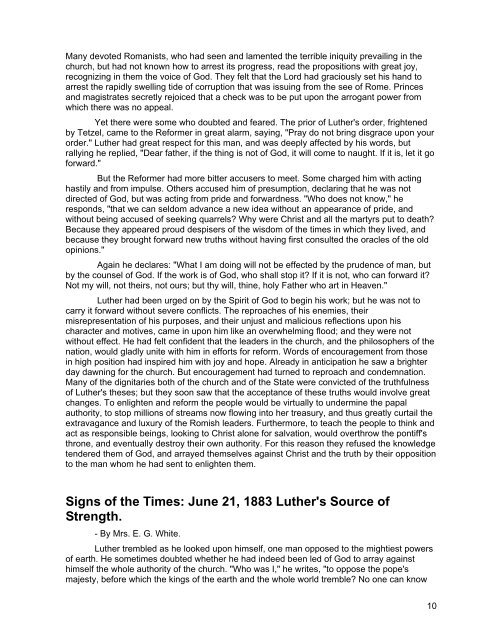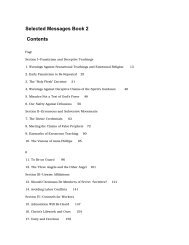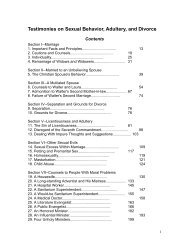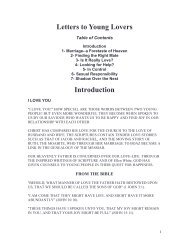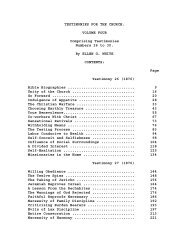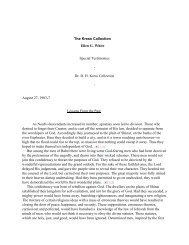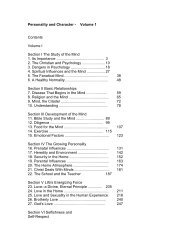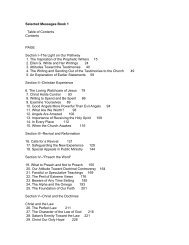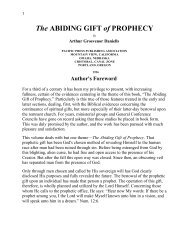Martin Luther - Ellen White Defend
Martin Luther - Ellen White Defend
Martin Luther - Ellen White Defend
You also want an ePaper? Increase the reach of your titles
YUMPU automatically turns print PDFs into web optimized ePapers that Google loves.
Many devoted Romanists, who had seen and lamented the terrible iniquity prevailing in the<br />
church, but had not known how to arrest its progress, read the propositions with great joy,<br />
recognizing in them the voice of God. They felt that the Lord had graciously set his hand to<br />
arrest the rapidly swelling tide of corruption that was issuing from the see of Rome. Princes<br />
and magistrates secretly rejoiced that a check was to be put upon the arrogant power from<br />
which there was no appeal.<br />
Yet there were some who doubted and feared. The prior of <strong>Luther</strong>'s order, frightened<br />
by Tetzel, came to the Reformer in great alarm, saying, "Pray do not bring disgrace upon your<br />
order." <strong>Luther</strong> had great respect for this man, and was deeply affected by his words, but<br />
rallying he replied, "Dear father, if the thing is not of God, it will come to naught. If it is, let it go<br />
forward."<br />
But the Reformer had more bitter accusers to meet. Some charged him with acting<br />
hastily and from impulse. Others accused him of presumption, declaring that he was not<br />
directed of God, but was acting from pride and forwardness. "Who does not know," he<br />
responds, "that we can seldom advance a new idea without an appearance of pride, and<br />
without being accused of seeking quarrels? Why were Christ and all the martyrs put to death?<br />
Because they appeared proud despisers of the wisdom of the times in which they lived, and<br />
because they brought forward new truths without having first consulted the oracles of the old<br />
opinions."<br />
Again he declares: "What I am doing will not be effected by the prudence of man, but<br />
by the counsel of God. If the work is of God, who shall stop it? If it is not, who can forward it?<br />
Not my will, not theirs, not ours; but thy will, thine, holy Father who art in Heaven."<br />
<strong>Luther</strong> had been urged on by the Spirit of God to begin his work; but he was not to<br />
carry it forward without severe conflicts. The reproaches of his enemies, their<br />
misrepresentation of his purposes, and their unjust and malicious reflections upon his<br />
character and motives, came in upon him like an overwhelming flood; and they were not<br />
without effect. He had felt confident that the leaders in the church, and the philosophers of the<br />
nation, would gladly unite with him in efforts for reform. Words of encouragement from those<br />
in high position had inspired him with joy and hope. Already in anticipation he saw a brighter<br />
day dawning for the church. But encouragement had turned to reproach and condemnation.<br />
Many of the dignitaries both of the church and of the State were convicted of the truthfulness<br />
of <strong>Luther</strong>'s theses; but they soon saw that the acceptance of these truths would involve great<br />
changes. To enlighten and reform the people would be virtually to undermine the papal<br />
authority, to stop millions of streams now flowing into her treasury, and thus greatly curtail the<br />
extravagance and luxury of the Romish leaders. Furthermore, to teach the people to think and<br />
act as responsible beings, looking to Christ alone for salvation, would overthrow the pontiff's<br />
throne, and eventually destroy their own authority. For this reason they refused the knowledge<br />
tendered them of God, and arrayed themselves against Christ and the truth by their opposition<br />
to the man whom he had sent to enlighten them.<br />
Signs of the Times: June 21, 1883 <strong>Luther</strong>'s Source of<br />
Strength.<br />
- By Mrs. E. G. <strong>White</strong>.<br />
<strong>Luther</strong> trembled as he looked upon himself, one man opposed to the mightiest powers<br />
of earth. He sometimes doubted whether he had indeed been led of God to array against<br />
himself the whole authority of the church. "Who was I," he writes, "to oppose the pope's<br />
majesty, before which the kings of the earth and the whole world tremble? No one can know<br />
10


